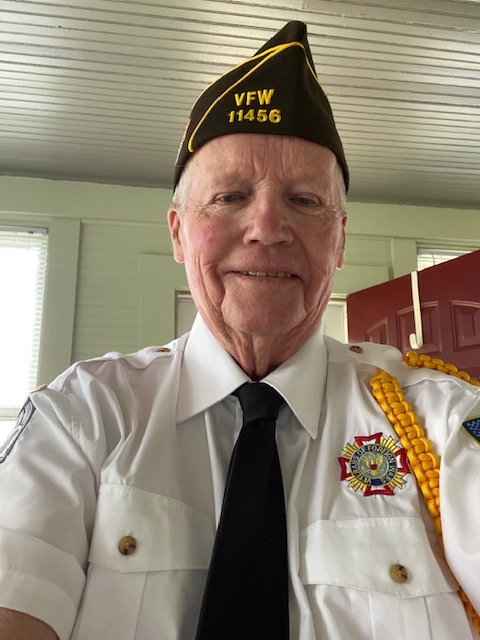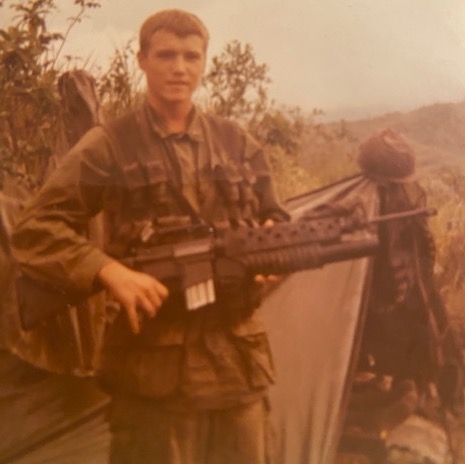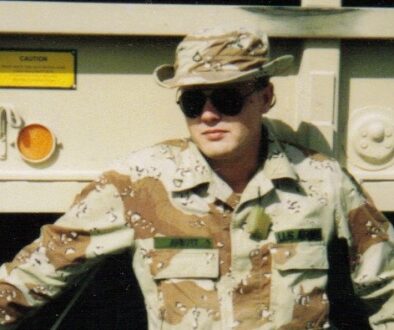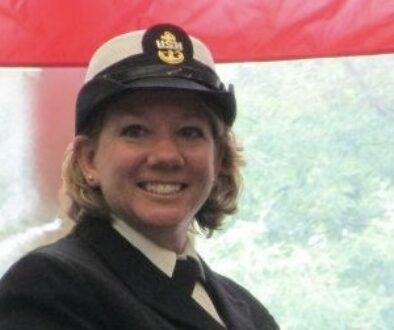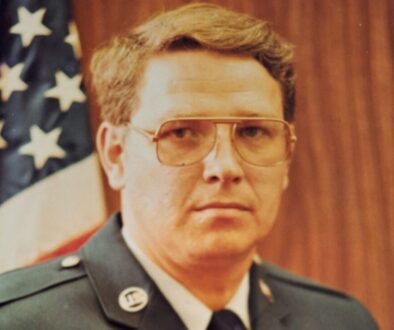Sergeant Russell J. Wright, U.S. Army – Fighting with the Americal Division in Vietnam
Sometimes people are presented with options having life changing consequences. Such was the case with Sergeant Russell J. Wright, U.S. Army, when he received his draft notice in May of 1970. With the war in Vietnam winding down and protestors clamoring for draftees to flee to Canada, Russ could have evaded the draft and kept himself safe from a war that had already killed tens of thousands of Americans. Instead, he chose to do his duty and report for service because he knew it was the right thing to do. Now, looking back on his service in the jungles and rice paddies of South Vietnam over fifty years later, Russ is proud of his service and would do it all again. This is his story.
Russ was born in November 1949 and raised in the small farming community of Bement, Illinois, located in Piatt County approximately 160 miles south of Chicago. His mom and dad operated a family farm, so Russ and his four sisters learned at an early age how to work hard. Russ was driving a tractor by the time he was eight and soon was operating other farming tools, as well. He helped with planting and harvesting corn, with milking dairy cows, and with tending to the pigs. He also learned to handle a rifle safely and loved to hunt pheasant with his grandad.
Although Russ continued to work on the farm throughout his years at Bement High School, he still found time for outside activities. He particularly enjoyed Future Farmers of America, serving as an officer of the school’s club for three years. He was also a manager for the football team for three years, helped with the basketball team in the winter, and played in the band. He graduated from Bement High School in May 1967.
After graduation, Russ enrolled at Parkland Community College in nearby Champaign, Illinois. To pay for school, he worked part-time at the Bement Post Office while continuing to help on his parents’ farm. He graduated with an Associate Degree in Agriculture from Parkland in May 1969 as part of the college’s very first graduating class and began working for the Kaiser Chemical Company at a local fertilizer plant. Then, in November 1969, he received a notice to report to Chicago for a pre-induction physical to see if he was physically qualified for service in the military. Being in excellent physical condition after working his entire life on the farm, Russ passed his physical and returned home, hoping he would not be drafted.
In December 1969, Russ married his high school sweetheart, Debby Tempel. Together with his new bride and a good job at Kaiser, his future looked bright. Then, in May 1970, he received his draft notice with instructions to report for in-processing in June. Although the war in Vietnam was beginning to wind down, the military still needed men and lots of them, and now it was Russ’s turn. Needless to say, Debby and Russ’s parents were shocked, especially with the war and protests against it playing out in the news every day on television, but Russ was committed to serving his country. He had high school friends who were still riding out deferments and he knew some young men who went to Canada to avoid serving, but neither of those options were for him. He considered it his patriotic duty to report as ordered.
On June 10, 1970, together with about five other young men from Piatt County, Russ boarded a chartered bus in Monticello, Illinois, for the trip to the induction site in Chicago. On the way, the bus stopped in DeWitt County, Illinois, to pick up additional draftees. When the bus arrived at the Armed Forces Examining and Entrance Station in Chicago, Russ and his fellow travelers were joined by hundreds of others from across the state being drafted into the military. After getting checked in, eating breakfast, and completing a short follow-on physical to make sure nothing had changed since their pre-induction physicals, the draftees were lined up and told to count off. Every third person was designated as a Marine; everyone else – including Russ – went Army.
After being sworn in, Russ and the other Army recruits were loaded onto buses and shuttled to O’Hare Airport. They were originally slated for Basic Training at Fort Leonard Wood in Missouri, but due to an outbreak of meningitis at the installation, they were instead instructed to board two big charter aircraft en route to Fort Polk, Louisiana. They landed at England Air Force Base in Alexandria, Louisiana, and transferred to buses for the last fifty miles. They arrived at Fort Polk around 3:00 a.m. and were hurried into the transient barracks to sleep, only to be roused at 6:00 a.m. to begin their first full day in the Army.
Despite the lack of sleep and the early start to the day, Russ found the transition to Army life fairly relaxed. They began by marching to chow, followed by in-processing activities for the next week. Russ wasn’t assigned to his Basic Training unit until June 19, and Basic Training didn’t begin until June 22. Even then, Russ found the experience tolerable because the drill instructors were trying out new techniques with Russ’s training company that proved very effective. Instead of the “in your face” approach drill instructors were famous for, they took a firm but fair instruction driven approach. As a result, Russ’s company scored much higher on proficiency tests than most other units.
Something else that made Russ’s Basic Training experience tolerable was his company’s billeting at North Fort Polk due to overflow conditions at South Fort Polk, where most of the training facilities were located. Given the distance from North Fort Polk, Russ’s company trucked to the training facilities rather than march to them as their counterparts at South Fort Polk did. This proved to be a substantial benefit given Louisiana’s high summer temperatures and humidity. Still, Russ felt his instructors prepared him well for what lay ahead.
Russ’s training company consisted of four platoons, with eighty-five percent of the men coming from National Guard units in Illinois, Kentucky, Louisiana, and Texas. Everyone got along well, with a healthy competition evolving in many of the areas of physical training, or “PT”. Russ was particularly good at “low crawling”, which his platoon practiced every night after chow. The men crawled fast on their stomachs twenty-yards out and twenty-yards back, all the time staying as low to the ground as possible. While competitive and fun at Fort Polk, the men knew the skill could save their lives in combat. Overall, Russ scored 95% on his physical fitness test.
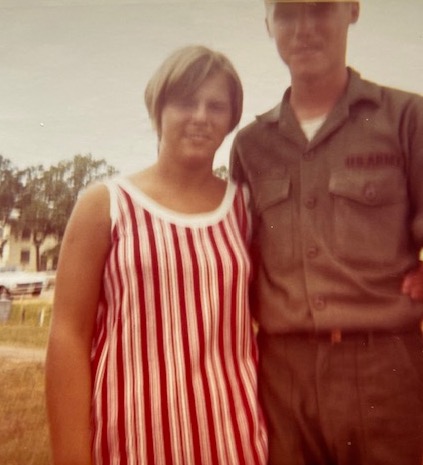
Basic Training lasted eight weeks and Russ’s parents, his four sisters, and Debby came to his graduation. After graduation, the new National Guard soldiers returned to their units in their states, while draftees like Russ continued with Advanced Individual Training (AIT), although they were given the weekend off. As Russ’s AIT was also at Fort Polk, all he had to do was pick up his gear and move to the AIT barracks about three blocks away. Even nicer, Debby stayed in Louisiana to be close to Russ throughout AIT. Although she wasn’t permitted to stay on base, she lived about eight miles away in Leesville, Louisiana, visiting Russ in the evening and when he had off on weekends.
AIT for infantry soldiers at Fort Polk was conducted at Tiger Land, where they learned how to fight and survive in the unforgiving jungles and rice paddies of South Vietnam. They spent lots of time at the weapons ranges honing their skills, learned first aid, and practiced map reading. They also trained at night, learning how to conduct patrols and set ambushes. Russ notes the one thing they didn’t learn was how to embark and disembark the helicopters that would ferry them everywhere in Vietnam. All they had to practice on were some static mock-ups, but it wasn’t like the real thing, jumping off a hovering helicopter into tall elephant grass. That Russ had to learn on the job, watching what the other soldiers did and then following their lead.
Toward the end of AIT, Russ and the other soldiers took tests to determine what type of Army job they were best suited for, known as their military occupational specialty, or “MOS”. They were also asked where they would like to be assigned. The test results indicated Russ would do well as a truck driver or a clerk-typist and perhaps one other field. As for locations, Russ selected Germany, Alaska, and Hawaii. After considering his test results and preferences, the Army assigned Russ to the infantry and told all the soldiers they were going to Vietnam. At least for a moment, there had been hope.
Russ graduated from AIT in October 1970 after nine weeks of intense training. He had fifteen days leave before he had to depart for Vietnam, so he and Debby packed their car for the drive back to Illinois. They also found room in the car for two soldiers heading in the same direction, dropping one off in St. Louis and the other in Springfield, Illinois. At the end of his leave, Russ said goodbye to Debby and the rest of his family and boarded a plane in Champaign, Illinois, to start his trek to Vietnam via San Francisco.
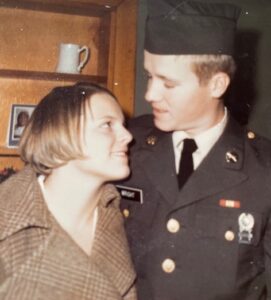
When Russ arrived at the airport in San Francisco, one of the first things he witnessed was a bunch of people protesting servicemen returning to the States from Vietnam. He saw the soldiers quickly change into civilian clothes so the protestors would leave them alone. As this was going on, Russ and the other servicemen on their way to Vietnam took a shuttle flight to Oakland, followed by a bus to the Oakland Army Terminal, where they waited until it was their turn to leave. After three days, Russ’s number was called and he took a bus to Travis Air Force Base, where he boarded a chartered Flying Tiger Airlines flight for the final leg of his journey.
After refueling stops in Anchorage, Alaska, and Yokota Air Base in Japan, Russ’s flight landed at Bien Hoa Air Base, located twenty-two miles northeast of Saigon, on November 15, 1970 – just five months after Russ took his enlistment oath in Chicago. As the plane made its approach to Bien Hoa, Russ could see bomb craters in the surrounding countryside, driving home he was arriving in a war zone. When the plane opened its doors, Vietnam’s 100-degree heat and the smell of aviation gas hit Russ and the rest of the passengers all at once. They disembarked the plane and loaded onto buses with wire mesh covering the windows to prevent grenades from being thrown inside – another not-so-subtle reminder of where they were.
Because Russ came to Vietnam as an individual replacement soldier and not as part of a unit, his bus transported him to the 90th Replacement Battalion at Long Binh, located four miles southeast of Bien Hoa. While he waited there to find out what his assignment would be, he ran into some buddies from AIT who were on their way to the 101st Airborne Division. Finally, his assignment was posted – he was on his way to the 23rd Infantry Division (Americal Division), which was headquartered in Chu Lai in the I Corps area of responsibility, in the northern portion of South Vietnam.
Since Chu Lai was almost 350 miles north of Saigon, Russ had to take a C-130 flight to get to his unit. After a two-day layover in Da Nang due to weather, he and another soldier heading to Chu Lai boarded a C-130 for the final sixty-miles of the trip. As the plane descended to land, a fog filled the fuselage. Russ began to panic, thinking it must be smoke and that the aircraft was on fire. The crew chief assured him it was nothing more than fog caused by the hot, moist outside air mingling with the cooler air inside the aircraft as it made its final approach. The crew chief turned out to be right and the plane landed without incident.
Once in Chu Lai, Russ was met by members of his unit and taken to the Americal Division Headquarters, where he checked in. He was then sent to two weeks of combat refresher training to prepare him to join his unit in the field. When he returned from the combat training facility, he bivouacked in a church, together with about fifty other soldiers waiting for barracks rooms. Russ, now a private first class (E-3), celebrated his twenty-first birthday while staying in the church.
Russ was eventually assigned to Charlie Company of the 2nd Battalion, 1st Infantry Regiment, 196th Infantry Brigade. As Charlie Company operated out of Firebase Hawk Hill further north on coastal Highway 1, Russ had to catch a ride on a two-and-half-ton truck (known as a “deuce and a half”) to get to the outpost. Once there, he was assigned to the company’s 3rd platoon, 2nd squad. His job as part of the squad was rifleman, his primary weapon being his M16 rifle.
Russ found the squad immediately welcoming. The squad leader, 1st Lieutenant Rodney Shortell, was squared away and really looked out for his men, as did the company’s 1st Sergeant, Gene Secrist. Everyone in the unit, whether black or white, career Army or draftee, helped each other. Everyone knew that out in the field, they would have each other’s back.
The platoon’s missions followed a pattern. The platoon would go into the field on patrol for up to fourteen days, then return to Firebase Hawk Hill for three days to re-arm, load up with rations, clean their weapons, and relax. Relaxation might involve spending time at the Enlisted Man’s Club, watching an occasional Korean band, or just sleeping. After three days, the platoon would head back into the field and start the cycle over again.
When Russ went into the field, he carried his M16 and a rucksack with 100 rounds of ammunition, canteens filled with water, C-rations, and a bandolier of M60 machine gun ammunition. He also carried a camera in his ammunition belt and a poncho – a critical piece of gear during Vietnam’s rainy season. At night, he could fasten his poncho together with that of a buddy and form a two-man pup tent, which at least theoretically would keep them dry in the rain. When fully loaded, Russ’s gear weighed eighty pounds, quite a load given Russ weighed only 140 pounds at the time. He and the other men often sat down to strap on their rucksacks, but then needed the assistance of another man to pull them to their feet under the heavy load.
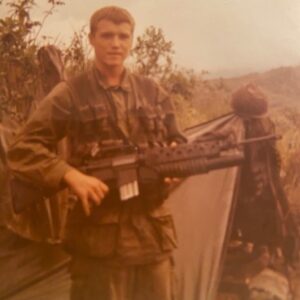
When it was time to go on patrol, Russ’s platoon loaded onto helicopters, which ferried them to their jump-off point. Once out of the helicopters, the platoon formed up, with a point man taking the lead and keeping a watchful eye out for booby traps. Although Russ was never the point man, he was often the second man in line, known as the “slack man”. The slack man’s job was to protect the point man and direct him where to go, since he could not do so for himself because he was focused on looking for booby traps. After Russ gained enough experience, he was authorized to carry one of the squad’s two M16s equipped with the M203 grenade launcher. While this gave him considerably more firepower, it also meant he had to wear a grenade launcher vest stuffed with 40-millimeter high-explosive grenades, phosphorous rounds, and fragmentation rounds. Not only did that make his load heavier, but it also made it more dangerous if the ordnance he was carrying detonated.
On one patrol through an area of rice paddies, helicopters could not extract Russ’s squad at the completion of their mission because of incessant rain. The men’s boots became so waterlogged from the rain and trudging through the rice paddies that the skin on their feet started to split open. When it became clear they weren’t going to get picked up anytime soon, the patrol moved to higher ground until the weather cleared. After a while, they started to run out of food, so a soldier from Kentucky killed a wild pig. Although the fire they used to cook the pig might have given away their position, they were so hungry, they were willing to take the chance. After five days, helicopters were eventually able to make it to their position and return them to Firebase Hawk Hill.
Just before Christmas 1970, Russ and five or six other men from his platoon volunteered for a mission at another forward firebase. The week before Christmas and all the week after, they manned a listening post on a hill overlooking the surrounding area. At night, they used starlight scopes to watch for enemy troop movements. When they saw something, they radioed in an artillery strike to eliminate the target. At the completion of their rotation, Russ and the other volunteers from his unit returned to Firebase Hawk Hill and another group of volunteers filled in behind them.
By January 10, 1971, Russ was back in the rice paddies on patrol. As his platoon crossed the paddies, someone started sniping at them and Russ could see the bullets whizzing by. The platoon took cover in a grove of banana trees and pitched camp for the night. When it came time to depart the next morning, Russ’s squad was at the rear, so it was designated the last to pull out. When the lead squad started to move, Russ heard a big boom as the enemy detonated mines, killing two of the lead squad’s soldiers. The two bodies were evacuated by helicopter and the patrol went on.
Later in January, Russ’s squad was resting on a hillside while out on patrol. Russ was playing spades under a poncho when he looked down the hillside and saw two men standing in the creek bed at the bottom of the hill. When Russ pointed them out to the lieutenant, they were identified as Viet Cong and taken under fire. Both men were shot as they ran from the area. The squad recovered AK-47s and a radio from the two men killed. Two more men were also seen running from the area. The squad called in artillery to deal with them.
In February, Russ’s platoon was on patrol in the Central Highlands. As Russ was walking on a narrow mountain trail, he slipped and tumbled 100 feet down the mountainside. The fall injured his ankle and he couldn’t walk, so he had to be evacuated by helicopter and returned to the firebase for treatment. Fortunately, his ankle wasn’t broken, but he had to be put on light duty until he was cleared to go back into the field. When 1st Sergeant Secrist saw Russ was on light duty, he asked Russ if he could type. When Russ told him yes, Russ found himself typing the company’s morning reports until he was taken off light duty.
In late February, Russ and the rest of Charlie Company moved to Firebase Alpha 2 in Quang Tri Province, just south of the demilitarized zone, or “DMZ”, between South and North Vietnam. Their mission was to provide security for the outpost after South Vietnamese Army forces departed to participate in an incursion into Laos, code named Lam Son 719, to disrupt the flow of North Vietnamese supplies down the Ho Chi Minh Trail. Russ’s platoon could see a North Vietnamese camp just across the Ben Hai River with the North Vietnamese flag flying high on a pole over the camp. The sight of the flag so irked some of the men at the firebase that one night they fired a quad-mounted 40-millimeter gun at the flagpole to take it out. The North Vietnamese retaliated with a rocket attack on the firebase. The next morning, the rising sun revealed the pole had been hit and was bent over and damaged, so the unit considered the episode an American victory.
One event near the DMZ that did not turn out well was when Russ’s platoon was called upon to rescue two pilots from a downed helicopter. Although Russ’s platoon raced to the crash site as fast as they could, the North Vietnamese arrived there first and took both pilots prisoner. Russ does not know what became of the captured pilots.
Russ and his company were relieved from Firebase Alpha 2 by the South Vietnamese Army on March 28, 1971. This was the same day that a bloody Viet Cong sapper attack killed thirty-three Americans and wounded eighty-three more at Firebase Mary Ann, another firebase in Quang Tri Province. Consequently, all American units in the area were on high alert.
Charlie Company departed Firebase Alpha 2 and moved to Firebase Rawhide in the vicinity of Khe Sanh, the site of the storied Marine Corps defense against the determined onslaught of the North Vietnamese Army in 1968. The company remained there for a few months, while Russ returned to Firebase Hawk Hill to become the company clerk and mail clerk. Sadly, on May 4, 1971, a member of Charlie Company was killed and two more wounded during a rocket attack by the North Vietnamese Army (NVA) at Firebase Rawhide. Russ had to report these casualties in the company’s morning report, as well as send the deceased soldier’s personal belongings to his next of kin.
At the end of May, both Russ and and the rest of Charlie Company moved to Camp Perdue, a former Marine Corps base southwest of Da Nang. Then in June, Russ was assigned to the Americal Division’s Headquarters and Headquarters Company (HHC) in Chu Lai, where he was responsible for typing the morning reports for various companies in the division. He started out with eight reports, but that number continued to grow until he was doing at least fifteen reports every morning. With the exception of a week of leave he took in July to visit Debby back in Illinois, the morning reports were his primary responsibility through November 1971.
Finally, on November 10, 1971, Russ boarded a blue chartered Braniff Airlines jet in Da Nang to head home. The plane taxied onto the runway, only to stop to allow two battle damaged F-4 fighter aircraft to land. Concern quickly spread among the passengers that they had survived the war only to be exposed to a rocket attack as their plane waited to take off. Finally, the plane was permitted to depart. After the plane took off, the pilot announced when they cleared South Vietnamese airspace. Everyone erupted in cheers.
After a brief stop at Yokota Air Base in Japan, Russ’s plane flew nonstop to McChord Air Force Base, just outside of Tacoma, Washington. Russ proceeded to Fort Lewis, the Army base collocated with McChord, for out-processing from Vietnam. There he received a complementary steak dinner for his service in Vietnam, as well as follow-on orders to Fort Hood, Texas, because he still had time left on his original two-year Army obligation.
Before heading to Fort Hood, Russ flew home to Illinois on thirty-days leave to visit Debby and the rest of his family. Then he and Debby packed their car and drove to Fort Hood to start Russ’s new assignment. They arrived in December and rented a hotel room by the week, having gotten a good deal from the hotel owner, who happened to be from Illinois.
When Russ reported for duty, he learned that although he was a specialist (E-4), he had been selected for promotion while in Vietnam and was immediately eligible to wear the stripes of a sergeant. This not only meant more money for him and Debby, but it also meant he would have greater authority in his new role. Unfortunately, his new role was leading a squad of new recruits learning to work on tanks, which Russ knew nothing about. All he could do was march them to the motor pool, watch them work on the tanks, and then march them back to the barracks at the end of the workday.
This didn’t last long because in January 1972, Russ was offered an early out, which he readily accepted. In his last official act as a squad leader, he took his soldiers out on an exercise where they were the aggressors against a helicopter squadron closing in on their position. As the helicopters drew near, one of Russ’s men fired his weapon equipped with a flash suppressor and the pressure from the blank round firing launched the suppressor toward an oncoming helicopter, breaking its window. Russ’s unit was jokingly credited with shooting down the helicopter. Fortunately, no one in the helicopter was injured and the only damage it sustained was the broken window.
Russ was honorably discharged from the Army on January 21, 1972, having earned two Bronze Stars, two Army Commendation Medals, a Good Conduct Medal, and the Combat Infantry Badge. He and Debby drove back to Bement, Illinois, where Russ returned to work at the Kaiser Chemical Company. Then, in August 1972, he took a job with the Bement Grain Elevator (which later became the Topflight Grain Cooperative), driving an eighteen-wheel truck for twenty-four years and then transitioning to an office position for twenty more. He retired on November 21, 2016, after forty-four years with the company.
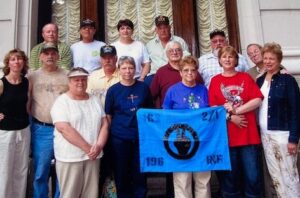
Not quite forty years after the incident where Russ spotted the two men in the creek bed, he started feeling guilty about causing their death even though they were clearly Viet Cong guerrilla fighters and legitimate enemy targets. What bothered him most was at the time, he had no remorse for their deaths because it was his job to kill enemy soldiers. Debby did her best to help Russ work through it, but it was getting back together with the men of his platoon starting in 2008 that really helped him deal with what he now realizes was post-traumatic stress disorder (PTSD). The group first met in New Orleans, and it was like they hadn’t skipped a beat since they last saw each other in 1971. They subsequently met in North Dakota in 2009 and at Arlington National Cemetery in 2010, where they tried to locate where the two men in their unit killed by the mines on January 11, 1971, were buried.
After learning that one of the men killed, Specialist Allen Gray, was from Belleville, Illinois, Russ returned home and contacted the Belleville newspaper and obtained a copy of Allen’s obituary. This led him to Allen’s brother in Texas and to Allen’s gravesite at the Valhalla Cemetery in St. Louis, Missouri. The men in Russ’s unit and Allen’s family, who did not know how Allen died, arranged to meet at Allen’s gravesite for a memorial service. Soldiers from Kentucky, Michigan, Wisconsin, Texas, and Illinois attended, as did an honor guard from Scott Air Force Base, located in Illinois outside St. Louis. Meeting everyone helped Russ deal with his PTSD and provided a degree of closure for Allen’s family. Russ stays in contact with Allen’s family to this day.
Russ is now retired and lives in east central Illinois, where he has lived since his discharge from the Army in 1972. Sadly, Debby passed away in 2020, but Russ’s and Debby’s four children (Matt, Marcus, Sarah, and Paul), seven grandchildren, and three great grandchildren still live nearby, so Russ has plenty of love and support from his family. He also remains active in both the American Legion and the Veterans of Foreign Wars (VFW), serves in the Honor Guard for veterans’ funerals, and went on an Honor Flight for Illinois military veterans in 2017. He is incredibly proud of his military service and the men he served with, and if called upon to do so, would willingly do it all again.
Voices to Veterans is proud to salute Sergeant Russel J. Wright, U.S. Army, for his dedicated service under fire during the Vietnam War. When the country called, he served willingly, putting himself in harm’s way to protect our freedom and that of our allies. He then returned to civilian life and together with his wife, Debby, raised a fine and loving family. Even while retired, he continues to serve his fellow veterans through the American Legion and the VFW. We sincerely thank him for all he has done and wish him fair winds and following seas.
If you enjoyed Russ’s story, please sign up for the Voices to Veterans Spotlight monthly newsletter by clicking here. Once each month, you’ll receive a new written veteran’s story and a new podcast directly in your mailbox. Best of all, it’s free and you can unsubscribe at any time.
